数字农业论文a
农业信息化与数字农业发展
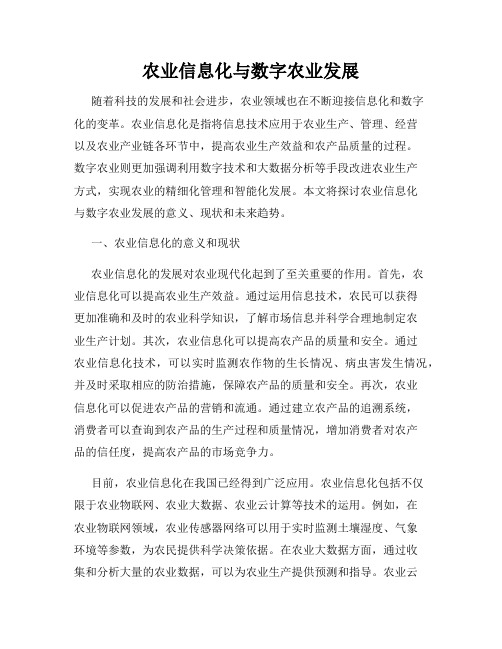
农业信息化与数字农业发展随着科技的发展和社会进步,农业领域也在不断迎接信息化和数字化的变革。
农业信息化是指将信息技术应用于农业生产、管理、经营以及农业产业链各环节中,提高农业生产效益和农产品质量的过程。
数字农业则更加强调利用数字技术和大数据分析等手段改进农业生产方式,实现农业的精细化管理和智能化发展。
本文将探讨农业信息化与数字农业发展的意义、现状和未来趋势。
一、农业信息化的意义和现状农业信息化的发展对农业现代化起到了至关重要的作用。
首先,农业信息化可以提高农业生产效益。
通过运用信息技术,农民可以获得更加准确和及时的农业科学知识,了解市场信息并科学合理地制定农业生产计划。
其次,农业信息化可以提高农产品的质量和安全。
通过农业信息化技术,可以实时监测农作物的生长情况、病虫害发生情况,并及时采取相应的防治措施,保障农产品的质量和安全。
再次,农业信息化可以促进农产品的营销和流通。
通过建立农产品的追溯系统,消费者可以查询到农产品的生产过程和质量情况,增加消费者对农产品的信任度,提高农产品的市场竞争力。
目前,农业信息化在我国已经得到广泛应用。
农业信息化包括不仅限于农业物联网、农业大数据、农业云计算等技术的运用。
例如,在农业物联网领域,农业传感器网络可以用于实时监测土壤湿度、气象环境等参数,为农民提供科学决策依据。
在农业大数据方面,通过收集和分析大量的农业数据,可以为农业生产提供预测和指导。
农业云计算则为农业数据的存储和处理提供了便捷和高效的方式。
同时,政府也在加大农业信息化的支持力度,推动农村地区的信息设施建设,提升农民对信息技术的接受能力。
二、数字农业的意义和现状数字农业是农业信息化发展的一个重要方向,它更加注重数字技术和大数据应用在农业当中的创新。
数字农业借助先进的传感技术、大数据分析和机器学习等手段,实现农业生产全过程的自动化、智能化和精细化管理。
数字农业的发展对农业生产、管理和经营模式带来了革命性的变化。
数字农业的概念及设计技术体系
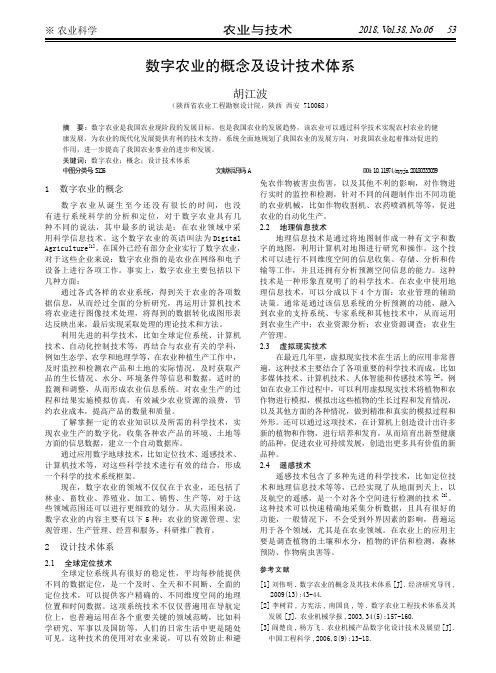
※农业科学农业与技术2018, V ol.38, No.0653数字农业的概念及设计技术体系胡江波(陕西省农业工程勘察设计院,陕西 西安 710068)摘 要:数字农业是我国农业现阶段的发展目标,也是我国农业的发展趋势,该农业可以通过科学技术实现农村农业的健康发展,为农业的现代化发展提供有利的技术支持,系统全面地规划了我国农业的发展方向,对我国农业起着推动促进的作用,进一步提高了我国农业事业的进步和发展。
关键词:数字农业;概念;设计技术体系中图分类号:S126文献标识码:A D O I:10.11974/n y y j s.201803330391数字农业的概念数字农业从诞生至今还没有很长的时间,也没有进行系统科学的分析和定位,对于数字农业具有几种不同的说法,其中最多的说法是:在农业领域中采用科学信息技术。
这个数字农业的英语叫法为Digital Agriculture[1]。
在国外已经有部分企业实行了数字农业,对于这些企业来说:数字农业指的是农业在网络和电子设备上进行各项工作。
事实上,数字农业主要包括以下几种方面:通过各式各样的农业系统,得到关于农业的各项数据信息,从而经过全面的分析研究,再运用计算机技术将农业进行图像技术处理,将得到的数据转化成图形表达反映出来,最后实现采取处理的理论技术和方法。
利用先进的科学技术,比如全球定位系统、计算机技术、自动化控制技术等,再结合与农业有关的学科,例如生态学、农学和地理学等,在农业种植生产工作中,及时监控和检测农产品和土地的实际情况,及时获取产品的生长情况、水分、环境条件等信息和数据,适时的监测和调整,从而形成农业信息系统。
对农业生产的过程和结果实施模拟仿真,有效减少农业资源的浪费,节约农业成本,提高产品的数量和质量。
了解掌握一定的农业知识以及所需的科学技术,实现农业生产的数字化,收集各种农产品的环境、土地等方面的信息数据,建立一个自动数据库。
通过应用数字地球技术,比如定位技术、遥感技术、计算机技术等,对这些科学技术进行有效的结合,形成一个科学的技术系统框架。
乡村振兴背景下中国数字农业高质量发展水平测度——基于2015—2019年全国31个省市数据的分析
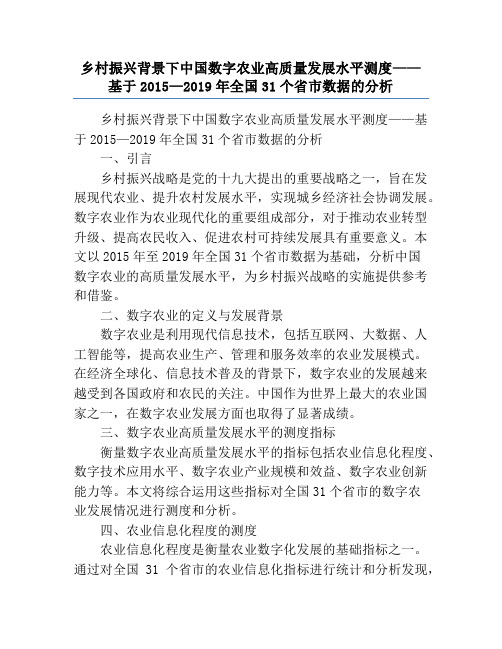
乡村振兴背景下中国数字农业高质量发展水平测度——基于2015—2019年全国31个省市数据的分析乡村振兴背景下中国数字农业高质量发展水平测度——基于2015—2019年全国31个省市数据的分析一、引言乡村振兴战略是党的十九大提出的重要战略之一,旨在发展现代农业、提升农村发展水平,实现城乡经济社会协调发展。
数字农业作为农业现代化的重要组成部分,对于推动农业转型升级、提高农民收入、促进农村可持续发展具有重要意义。
本文以2015年至2019年全国31个省市数据为基础,分析中国数字农业的高质量发展水平,为乡村振兴战略的实施提供参考和借鉴。
二、数字农业的定义与发展背景数字农业是利用现代信息技术,包括互联网、大数据、人工智能等,提高农业生产、管理和服务效率的农业发展模式。
在经济全球化、信息技术普及的背景下,数字农业的发展越来越受到各国政府和农民的关注。
中国作为世界上最大的农业国家之一,在数字农业发展方面也取得了显著成绩。
三、数字农业高质量发展水平的测度指标衡量数字农业高质量发展水平的指标包括农业信息化程度、数字技术应用水平、数字农业产业规模和效益、数字农业创新能力等。
本文将综合运用这些指标对全国31个省市的数字农业发展情况进行测度和分析。
四、农业信息化程度的测度农业信息化程度是衡量农业数字化发展的基础指标之一。
通过对全国31个省市的农业信息化指标进行统计和分析发现,广东、江苏、浙江等地农业信息化程度较高,湖南、贵州、河南等地则相对较低。
这与这些地区的经济发展水平和信息技术基础设施建设水平有关。
五、数字技术应用水平的测度数字技术在农业生产、管理和服务中的应用水平是衡量数字农业发展的重要指标。
通过数据分析,发现全国各地在数字农业技术应用方面存在较大的差异。
部分省市的数字技术应用水平较高,如北京、上海等地,而一些省份则存在数字技术应用水平较低的情况,如广西、江西等地。
六、数字农业产业规模和效益的测度数字农业的发展离不开产业规模的扩大和经济效益的提升。
数字农业

数字农业A数字农业概念及特点数字农业——1997年由美国科学院、工程院两院士正式提出。
数字农业是将信息作为农业生产要素,用现代信息技术对农业对象、环境和全过程进行可视化表达、数字化设计、信息化管理的现代农业。
数字农业使信息技术与农业各个环节实现有效融合,对改造传统农业、转变农业生产方式具有重要意义。
数字农业将遥感、地理信息系统、全球定位系统、计算机技术、通讯和网络技术、自动化技术等高新技术与地理学、农学、生态学、植物生理学、土壤学等基础学科有机地结合起来,实现在农业生产过程中对农作物、土壤从宏观到微观的实时监测,以实现对农作物生长、发育状况、病虫害、水肥状况以及相应的环境进行定期信息获取,生成动态空间信息系统,对农业生产中的现象、过程进行模拟,以达到合理利用农业资源,降低生产成本,改善生态环境,提高农作物产品和质量的目的。
B数字农业的组成数字农业是一个集合概念,它主要包含以下4个主要部分:1.农业物联网(Internet of Things)农业物联网从本质上讲,是一套数控系统。
在一个特定的封闭系统内,以探头、传感器、摄像头等设备为基础的物物相联。
它根据已经确定的参数和模型,进行自动化调控和操作。
由于需要以硬件设备的投资和联网为基础,因此投资额较大,主要用于设施农业生产过程的管理和操作,也用于农产品的加工、仓储和物流管理。
2.农业大数据(Big Data)农业大数据是与农业物联网相对应的概念,它是一个数据系统,在开放系统中收集、鉴别、标识数据,并建立数据库,通过参数、模型和算法来组合和优化多维和海量数据,为生产操作和经营决策提供依据,并实现部分自动化控制和操作。
因为它是在完全开放的系统中运作,因此主要用于大田农业的生产和农业全产业链的操作和经营。
3.精准农业(Precision Farming)精准农业是建立在农机硬件基础上的执行和操作系统。
它主要是以农机的单机硬件为基础,配以探测设备和智能化的控制软件,以实现精准操作,变量控制(包括变量播种、变量施肥、变量喷药等),无人驾驶,以及最佳的工作环境和场景适配。
物联网技术在智能农业中的应用研究毕业论文
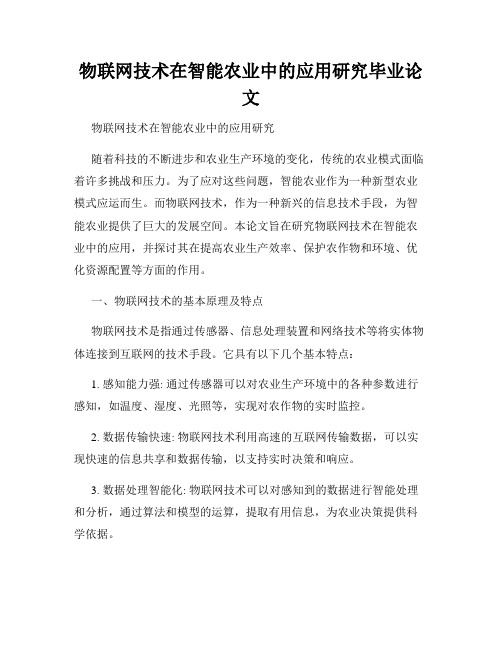
物联网技术在智能农业中的应用研究毕业论文物联网技术在智能农业中的应用研究随着科技的不断进步和农业生产环境的变化,传统的农业模式面临着许多挑战和压力。
为了应对这些问题,智能农业作为一种新型农业模式应运而生。
而物联网技术,作为一种新兴的信息技术手段,为智能农业提供了巨大的发展空间。
本论文旨在研究物联网技术在智能农业中的应用,并探讨其在提高农业生产效率、保护农作物和环境、优化资源配置等方面的作用。
一、物联网技术的基本原理及特点物联网技术是指通过传感器、信息处理装置和网络技术等将实体物体连接到互联网的技术手段。
它具有以下几个基本特点:1. 感知能力强: 通过传感器可以对农业生产环境中的各种参数进行感知,如温度、湿度、光照等,实现对农作物的实时监控。
2. 数据传输快速: 物联网技术利用高速的互联网传输数据,可以实现快速的信息共享和数据传输,以支持实时决策和响应。
3. 数据处理智能化: 物联网技术可以对感知到的数据进行智能处理和分析,通过算法和模型的运算,提取有用信息,为农业决策提供科学依据。
4. 系统集成能力强: 物联网技术可以将各种农业设备、数据和系统有机地集成在一起,实现农业信息的互通和协同,提高农业生产效率和质量。
二、物联网技术在智能农业中的应用实践1. 农业生产全程监控与管理物联网技术可以实现对整个农业生产过程的全程监控与管理。
通过在农田中布置传感器,可以实时感知土壤湿度、温度、光照等信息,同时结合气象数据和作物生长模型,对农作物的生长状态进行精确预测和调控。
此外,物联网技术还可以实现对农机设备和农产品的追溯管理,提高农产品的质量和安全性。
2. 智能灌溉与施肥通过布置在田间的传感器和自动控制装置,物联网技术可以实现对农田的智能灌溉和施肥管理。
传感器可以感知土壤湿度、肥料含量等重要信息,通过与农业专家的算法和模型相结合,实现对灌溉和施肥设备的智能控制和优化调度,避免水肥浪费,并提高农作物的产量和品质。
农学毕业论文(精选多篇)
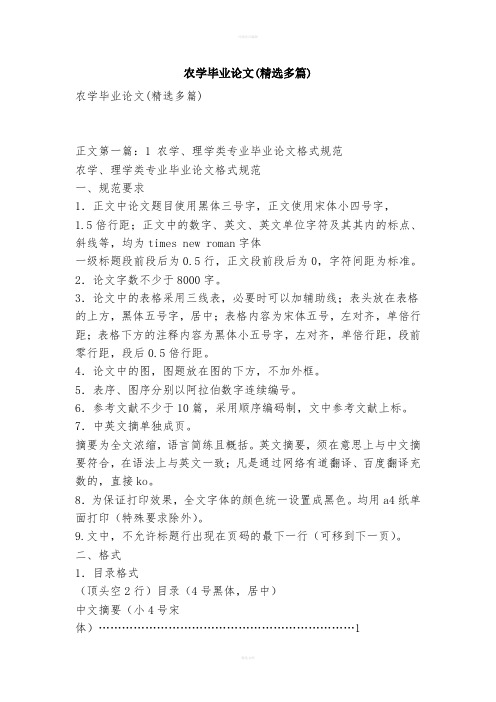
农学毕业论文(精选多篇)农学毕业论文(精选多篇)正文第一篇:1 农学、理学类专业毕业论文格式规范农学、理学类专业毕业论文格式规范一、规范要求1.正文中论文题目使用黑体三号字,正文使用宋体小四号字,1.5倍行距;正文中的数字、英文、英文单位字符及其其内的标点、斜线等,均为times new roman字体一级标题段前段后为0.5行,正文段前段后为0,字符间距为标准。
2.论文字数不少于8000字。
3.论文中的表格采用三线表,必要时可以加辅助线;表头放在表格的上方,黑体五号字,居中;表格内容为宋体五号,左对齐,单倍行距;表格下方的注释内容为黑体小五号字,左对齐,单倍行距,段前零行距,段后0.5倍行距。
4.论文中的图,图题放在图的下方,不加外框。
5.表序、图序分别以阿拉伯数字连续编号。
6.参考文献不少于10篇,采用顺序编码制,文中参考文献上标。
7.中英文摘单独成页。
摘要为全文浓缩,语言简练且概括。
英文摘要,须在意思上与中文摘要符合,在语法上与英文一致;凡是通过网络有道翻译、百度翻译充数的,直接ko。
8.为保证打印效果,全文字体的颜色统一设置成黑色。
均用a4纸单面打印(特殊要求除外)。
9.文中,不允许标题行出现在页码的最下一行(可移到下一页)。
二、格式1.目录格式(顶头空2行)目录(4号黑体,居中)中文摘要(小4号宋体) (1)abstract..........................................................................................1 引言(或绪论) (1)1□材料与方法………………………………………………………………………y1.1□材料……………………………………………………………………………y1.2□方法……………………………………………………………………………y1.2.1□×××××…………………………………………………………………y1.2.2□×××××…………………………………………………………………y1.2.3□×××××…………………………………………………………………y2□××………………………………………………………………………………y2.1□×××××……………………………………………………………………y2.2□×××××……………………………………………………………………y2.3□×××××……………………………………………………………………y3□×××……………………………………………………………………………y ……………………………………………………………(略)致谢……………………………………………………………………………………y 参考文献………………………………………………………………………………y 附录a××××(必要时)………………………………………………………y 附录b××××(必要时)………………………………………………………y 图1××××(必要时)…………………………………………………………y 图2××××(必要时)…………………………………………………………y 表1××××(必要时)……………………………………………………………y 表2××××(必要时)……………………………………………………………y 注:1. 目次中的内容一般列出三级标题即可;2.x、y表示具体的阿拉伯数字;3. 文中的□,表示一个空格。
数字农业发展趋势分析
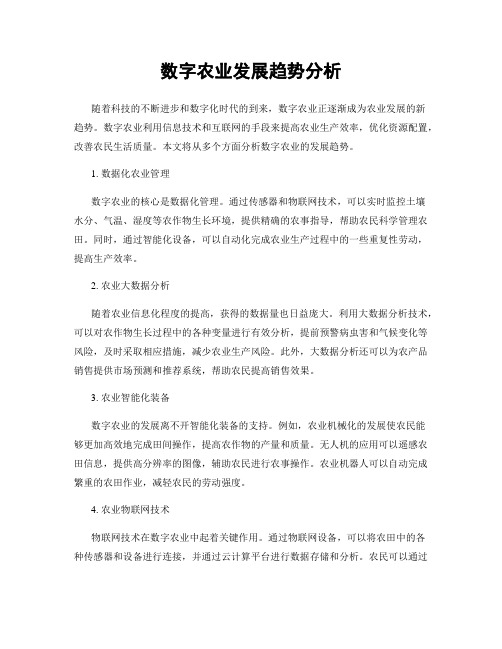
数字农业发展趋势分析随着科技的不断进步和数字化时代的到来,数字农业正逐渐成为农业发展的新趋势。
数字农业利用信息技术和互联网的手段来提高农业生产效率,优化资源配置,改善农民生活质量。
本文将从多个方面分析数字农业的发展趋势。
1. 数据化农业管理数字农业的核心是数据化管理。
通过传感器和物联网技术,可以实时监控土壤水分、气温、湿度等农作物生长环境,提供精确的农事指导,帮助农民科学管理农田。
同时,通过智能化设备,可以自动化完成农业生产过程中的一些重复性劳动,提高生产效率。
2. 农业大数据分析随着农业信息化程度的提高,获得的数据量也日益庞大。
利用大数据分析技术,可以对农作物生长过程中的各种变量进行有效分析,提前预警病虫害和气候变化等风险,及时采取相应措施,减少农业生产风险。
此外,大数据分析还可以为农产品销售提供市场预测和推荐系统,帮助农民提高销售效果。
3. 农业智能化装备数字农业的发展离不开智能化装备的支持。
例如,农业机械化的发展使农民能够更加高效地完成田间操作,提高农作物的产量和质量。
无人机的应用可以遥感农田信息,提供高分辨率的图像,辅助农民进行农事操作。
农业机器人可以自动完成繁重的农田作业,减轻农民的劳动强度。
4. 农业物联网技术物联网技术在数字农业中起着关键作用。
通过物联网设备,可以将农田中的各种传感器和设备进行连接,并通过云计算平台进行数据存储和分析。
农民可以通过手机或电脑随时随地监测农田状况,及时调整农业生产策略。
同时,物联网技术还可以实现设备之间的协同工作,提高农业生产效率。
5. 农业可视化技术数字农业还可以利用可视化技术,将农田中的各种数据以图形或图像的形式进行展示。
农民可以通过图表和图像直观地了解农作物的生长状态和环境条件,并根据数据进行决策,提高农业生产效益。
此外,可视化技术还可以帮助农民进行农业教育和培训,提升他们的技术水平。
6. 农业生态环境保护数字农业的发展也有利于农业生态环境的保护。
数字农业论文

数字农业论文摘要数字农业是指利用计算机、通信技术、传感器以及其他现代科技手段,对农业生产过程进行数据采集、处理和分析的一种新型农业生产方式。
本文从数字农业的定义、发展背景、关键技术及应用案例等方面进行探讨,旨在为农业生产者提供一种更高效、更智能的农业生产方式。
1. 引言随着科学技术的飞速发展,农业生产方式正朝着数字化、智能化的方向迅猛发展。
数字农业作为一种创新型农业生产模式,改变了传统农业生产方式中的很多传统农业生产方法,为农业生产者提供了更高效、更智能的农业生产方式。
2. 数字农业的定义数字农业是指利用计算机、通信技术、传感器以及其他现代科技手段,对农业生产过程进行数据采集、处理和分析的一种新型农业生产方式。
数字农业通过采集农田中的土壤温度、湿度、养分含量等数据,结合气象数据和植物生长数据,利用先进的算法和模型对农作物的生长过程进行实时监测和预测,从而实现对农田的精细化管理。
3. 数字农业的发展背景数字农业的发展离不开计算机技术、通信技术以及其他现代科技的进步。
随着传感器技术的发展和成本的降低,传统农业生产过程中的许多工作可以被自动化、智能化地完成。
同时,大数据和人工智能技术的发展使得数字农业能够更好地处理和分析农业生产过程中所产生的海量数据,从而提高农业生产的效率和质量。
4. 数字农业的关键技术实现数字农业需要应用到多种关键技术,包括传感器技术、无线通信技术、云计算、大数据分析和人工智能等。
其中,传感器技术是数字农业的基础,通过传感器采集农田中的温度、湿度、光照等数据,并将数据传输到云端进行存储和分析。
云计算和大数据分析技术可以对采集到的农田数据进行深度学习和模式识别,从而实现对农作物生长过程的预测和优化。
人工智能技术则可以帮助农业生产者制定更合理的农业生产计划,同时提供农药、肥料的用量推荐,从而最大程度地提高农业生产效益。
5. 数字农业的应用案例数字农业在实际应用中具有广阔的发展前景。
以下为几个典型的应用案例。
数字农业的现状及未来发展方向
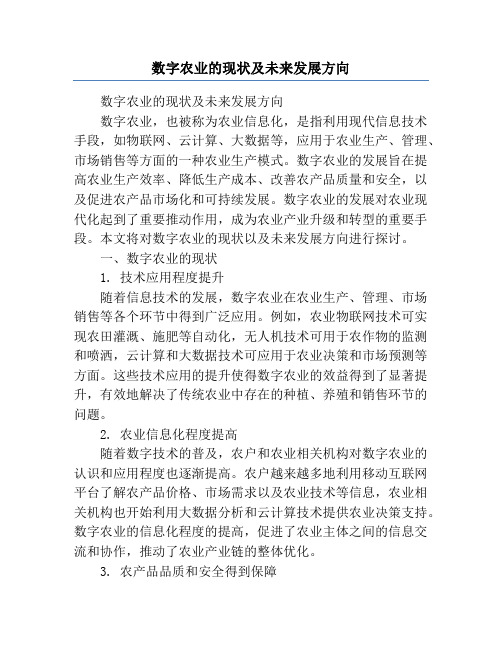
数字农业的现状及未来发展方向数字农业的现状及未来发展方向数字农业,也被称为农业信息化,是指利用现代信息技术手段,如物联网、云计算、大数据等,应用于农业生产、管理、市场销售等方面的一种农业生产模式。
数字农业的发展旨在提高农业生产效率、降低生产成本、改善农产品质量和安全,以及促进农产品市场化和可持续发展。
数字农业的发展对农业现代化起到了重要推动作用,成为农业产业升级和转型的重要手段。
本文将对数字农业的现状以及未来发展方向进行探讨。
一、数字农业的现状1. 技术应用程度提升随着信息技术的发展,数字农业在农业生产、管理、市场销售等各个环节中得到广泛应用。
例如,农业物联网技术可实现农田灌溉、施肥等自动化,无人机技术可用于农作物的监测和喷洒,云计算和大数据技术可应用于农业决策和市场预测等方面。
这些技术应用的提升使得数字农业的效益得到了显著提升,有效地解决了传统农业中存在的种植、养殖和销售环节的问题。
2. 农业信息化程度提高随着数字技术的普及,农户和农业相关机构对数字农业的认识和应用程度也逐渐提高。
农户越来越多地利用移动互联网平台了解农产品价格、市场需求以及农业技术等信息,农业相关机构也开始利用大数据分析和云计算技术提供农业决策支持。
数字农业的信息化程度的提高,促进了农业主体之间的信息交流和协作,推动了农业产业链的整体优化。
3. 农产品品质和安全得到保障数字农业在农产品质量和安全方面也起到了重要作用。
通过数字农业技术的应用,农民可以更好地控制农药、化肥的使用量,监测农田的土壤和水质状况,提高农产品的品质和安全性。
数字农业还可以通过追溯系统,对农产品的生产环节进行记录和追踪,保障农产品的品牌形象和消费者权益。
二、数字农业的未来发展方向1. 智能农田的建设未来,数字农业的发展将更加注重智能农田的建设。
通过农业物联网技术的应用,实现农田的智能化管理,包括温度、湿度、土壤酸碱度的实时监测和调控,自动化的循环灌溉和施肥等。
农业论文格式范文3篇

农业论⽂格式范⽂3篇华南农业⼤学毕业论⽂格式华南农业⼤学毕业论⽂格式毕业论⽂(设计)(题⽬)——————————(副标题)——————————(作者姓名)—————————————————学院名称理学院专业名称计算机科学与技术(姓名、职称)指导教师———————————————————————————————————————————————————论⽂提交⽇期———————————————————————论⽂答辩⽇期———————————————————————答辩委员会主席————————————————————评阅⼈————————————————————年⽉⽇计算机科学与技术专业毕业论⽂的撰写1对论⽂的要求论⽂的⼀般要求:①要形成论点,不宜在论⽂中作全⾯的历史回顾。
②结论要适当,要从实际出发,结论要恰⼊其分,不能夸⼤,也不必缩⼩。
③重点要突出,论⽂要集中对某⼀个问题的研究,并得出明确的结论,不宜庞杂和⾯⾯俱到。
④问题要符合科学论⽂的要求,以充分的事实为论据,以合乎逻辑的推理来论证,在语⾔⽅⾯要朴实、准确,条例清除,⽂字要简练易懂,虽然不追求华丽的词藻,但也要⼒求⽣动感⼈。
⑤⼀篇毕业论⽂⼀般应不少于10000字(20页以上)。
⑥统⼀⽤A4纸打印,题⽬⽤三号字、标题⽤四号字、正⽂⽤⼩四号字。
⑦⽂中的表格⼒求简明,采⽤三线图。
图次和表次⼀律写成图1,图2,……,并尽可能随⽂排。
正⽂层次标题应简短明确,以不超过15个字为宜,各层次⼀律⽤阿拉伯数字连续符号,不同层次的数字之间⽤圆点“.”相隔,题末不要加标点,如:122.12.1.1……表和图的标题不要附英⽂标题。
2论⽂的结构毕业设计由毕业设计说明书和附件两部分组成,论⽂的结构,⾄少应包括以下⼏个⽅⾯:2.1题⽬题⽬要确切、恰当、鲜明、简短,既能概括全⽂的内容,也能引⼈注⽬,题⽬写在如开始页所⽰的封⾯页中。
2.2⽬录将论⽂的各项标题列出,并表明其页码。
数字技术赋能农业农村高质量发展研究的国外研究综述

数字技术赋能农业农村高质量发展研究的国外研究综述1. "Smart Farming Technologies for Sustainable Agricultural Development: A Systematic Literature Review" (2019) - 该研究对智能农业技术在可持续农业发展中的应用进行了系统的文献综述。
研究发现智能农业技术可以提高农业生产效率、节约资源、减少环境影响,并对农村社区发展产生积极影响。
2. "Digital Agriculture for Food Security and Rural Development: The Case of Smart Farming in Africa" (2018) - 该研究探讨数字农业技术对非洲粮食安全和农村发展的影响。
研究发现,智能农业技术可以提高非洲农民的农业生产和经济状况,并推动整个农村社区的可持续发展。
3. "The Role of Digital Agriculture in Rural Development: A Case Study in China" (2020) - 该研究通过案例研究探讨数字农业技术在中国农村发展中的作用。
研究发现,数字农业技术可以提高农民的收入和生活质量,促进农村地区的经济发展和社会稳定。
4. "Application of Precision Agriculture Technologies for Sustainable Crop Production: A Review" (2017) - 该综述研究了精准农业技术在可持续农作物生产中的应用。
研究发现,精准农业技术可以提高农作物的产量和质量,减少农药和化肥的使用,并减少农业对环境的影响。
5. "Farm-Level Adoption of Precision Agriculture Technologies: A Review and Meta-Analysis" (2019) - 该研究通过综述和元分析,评估农场对精准农业技术的采用情况。
数字技术在农业中的力量英语作文

数字技术在农业中的力量英语作文全文共10篇示例,供读者参考篇1Technology is super cool! Do you know how it can help farmers grow lots of yummy food for us to eat? Let me tell you all about it!First of all, farmers use technology to help them plant their crops in straight rows and at just the right spacing. They use machines like tractors and planters to make sure the seeds are planted evenly and efficiently. This saves them lots of time and energy!Next, technology helps farmers keep their crops healthy. They can use drones to fly over their fields and take pictures with special cameras. This helps them see if any plants are sick or if there are pests eating them. Farmers can then use this information to apply the right amount of fertilizer or pesticides to help their crops grow strong and healthy.Technology also helps farmers harvest their crops faster and more efficiently. They can use machines like combine harvesters to quickly gather all the ripe fruits and vegetables. This savesthem a lot of time and makes sure none of the food goes to waste.Overall, technology is a powerful tool that helps farmers feed us all. Without it, farming would be much harder and we might not have enough food to eat. So let's give a big cheer for technology and the farmers who use it to grow our food! Yay for technology in agriculture!篇2Title: The Power of Math and Technology in AgricultureHey guys, do you know that math and technology can help make farming super cool and efficient? Let me tell you all about it!First of all, let's talk about math. Math is like a magic wand for farmers. They use math to figure out things like how much fertilizer to use, how to plant crops in the best way, and even how to predict the weather. Farmers use math to calculate the right amount of water, sunlight, and nutrients for their plants. It's like a superpower that helps them grow the best veggies and fruits!Now, let's move on to technology. Technology is like a superhero for farmers. They use things like drones to monitor their fields from above, sensors to track the moisture in the soil, and even robots to pick crops. Technology helps farmers save time and energy, and it also helps them reduce waste and make their farms more sustainable. It's like having a team of robots and machines working for you!When math and technology come together, they create a powerful force that can revolutionize agriculture. Farmers can use data and algorithms to make smarter decisions, increase their productivity, and protect the environment. Thanks to math and technology, farming is becoming more efficient, more sustainable, and more awesome than ever before.So, next time you see a field of crops or enjoy a juicy apple, remember the power of math and technology in agriculture. They're not just for solving homework problems or playing video games – they're also making a big difference in the world of farming. Let's cheer for math and technology, the unsung heroes of the agriculture industry!篇3Title: The Power of Technology in AgricultureHello everyone! Today I want to talk about how technology is helping farmers in their fields. Technology is like magic that makes everything easier and faster. Let's see how farmers are using technology to grow more food!First of all, farmers are using machines to plow the fields. It used to be very hard work to plow the fields by hand, but now farmers can use tractors and plows to do it much faster. This means they can plant more crops and grow more food for us to eat.Secondly, farmers are using drones to monitor their fields. Drones are like small airplanes with cameras that can fly over the fields and take pictures. This helps farmers to see if there are any problems with their crops, like bugs or diseases. They can then take action to protect their plants and make sure they grow healthy and strong.Another way technology is helping farmers is through the use of weather forecasts. Farmers can check the weather forecast on their phones or computers to see if it will rain or be sunny. This helps them to plan when to plant their crops and when to harvest them. It's like having a crystal ball to see into the future!Lastly, farmers are using special sensors in the soil to measure things like moisture and nutrients. This helps them toknow if they need to add more water or fertilizer to their crops. It's like having a doctor for their plants that tells them exactly what they need to grow big and tasty.In conclusion, technology is like a superhero for farmers, helping them to grow more food and feed the world. We should all be thankful for the power of technology in agriculture! Thank you for listening!篇4Title: The Power of Technology in AgricultureHey guys! Do you know how cool technology is? It’s not just for playing games or watching videos, it can also help us in farming! Today, I want to talk about how technology is making a big difference in agriculture.First of all, let’s talk about tractors. Have you seen those big machines in the fields that move by themselves and do all the hard work? Those are called tractors! With the help of technology, farmers can use tractors to plow the fields, plant seeds, and harvest crops much faster and easier than before. This saves them a lot of time and energy, so they can focus on other important tasks.Next, let’s talk about drones. Drones are like little airplanes that can fly high up in the sky and take pictures of the fields below. Farmers use drones to monitor the health of their crops, check for pests and diseases, and even water their plants from above! This helps them make better decisions and take care of their crops more efficiently.And don’t forget about weather forecasting. With the help of technology, farmers can check the weather forecast on their phones or computers. This helps them plan ahead and know when to plant or harvest their crops, or when to protect them from bad weather like storms or droughts.In conclusion, technology is amazing and it’s making a big impact in agriculture. With the help of tractors, drones, and weather forecasting, farmers can grow more food, protect their crops, and take care of the environment. So next time you see a farmer working in the fields, remember that they are not alone –they have technology on their side!篇5Hey guys, do you know how cool technology is? Well, let me tell you about how technology is making a big impact on agriculture!Technology has changed the way we do farming in so many ways. For example, we have machines like tractors and harvesters that help us plant and harvest crops much faster than before. This saves us a lot of time and makes farming more efficient.But that’s not all! We also have things like drones that can fly over fields and take pictures. These pictures help farmers see if their crops are healthy or if they need more water. It’s like having a bird’s eye view of the farm!And have you heard of something called precision agriculture? It’s super cool! Precision agriculture uses technology like GPS to plant seeds and apply fertilizer in just the right spots. This helps farmers save money and protect the environment too.Technology is also helping farmers keep track of their animals. They can use sensors to monitor things like how much food the animals are eating or if they are sick. This helps farmers take better care of their animals and make sure they are healthy.In conclusion, technology is like a superpower for farmers. It helps them work faster, smarter, and more efficiently. So next time you eat some vegetables or meat, remember that technology played a big role in getting that food to your plate. Agriculture + technology = a winning combination!篇6Technology in agriculture is super cool! It helps farmers grow more food and take care of crops and animals. There are lots of ways technology is used in agriculture, and it makes farming easier and more productive.One cool thing technology does is help farmers know exactly when to plant their crops. There are special machines that can measure soil moisture and temperature, so farmers know the best time to plant their seeds. This helps the crops grow better and produce more food.Technology also helps farmers take care of their crops and animals. There are machines that can water the crops automatically, so farmers don't have to spend hours watering by hand. And there are robots that can help milk cows and feed animals, making it easier for farmers to take care of their livestock.Another way technology helps farmers is by using drones to monitor their fields. Drones can fly over the fields and take pictures, so farmers can see if there are any problems, like pests or diseases. This helps farmers catch problems early and take care of them before they spread.Technology is super important in agriculture, and it's helping farmers all over the world grow more food and take care of their land. I think it's really cool how technology is making farming easier and more productive. I can't wait to see what new technologies will be used in agriculture in the future!篇7The Power of Technology in AgricultureHey guys, today I want to talk about how cool technology is in helping farmers grow our food! You know, without technology, we wouldn't have all the yummy fruits and veggies we love to eat.First off, let's talk about tractors. These big machines help farmers plow the fields, plant the seeds, and harvest the crops. Can you imagine how long it would take to do all that by hand? Technology is super handy in saving time and making the work easier for farmers.Next, let's talk about irrigation systems. These are like magic sprinklers that water the crops automatically. With technology, farmers can control when and how much water the plants need, which helps them grow big and healthy. Plus, it saves water too!Another cool thing is drones. These flying robots can take pictures of the fields from above and show farmers where the plants need more care. They can also help monitor pests and diseases, so farmers can take action before it's too late.And let's not forget about GPS. With GPS, farmers can plan the best routes for planting crops, apply fertilizers and pesticides precisely, and even track their animals. It's like having a map on the farm!In conclusion, technology is a powerful tool in agriculture. It helps farmers work more efficiently, produce more food, and take better care of the environment. So next time you eat a delicious meal, remember to thank the farmers and the awesome technology that made it possible!篇8Technology is super cool! It can help us do so many things, like playing video games, watching movies, and even helping farmers grow food! Today, I want to talk about how technology is super powerful in agriculture.First of all, technology helps farmers grow more food. Back in the old days, farmers had to rely on the weather and their own skills to know when to plant and harvest crops. But withtechnology, farmers can use machines and tools to make their work easier and faster. For example, tractors help farmers plow the fields, plant seeds, and harvest crops much quicker than doing it all by hand. This means we can have more fruits, vegetables, and grains to eat!Another way technology helps in agriculture is by making farming more efficient. Farmers can use drones to fly over their fields and take pictures. These pictures show them where crops are growing well and where they might need more water or fertilizer. This helps farmers take better care of their plants and make sure they grow big and healthy.Technology also helps farmers protect their crops from pests and diseases. They can use sensors in the ground to detect when bugs are eating the plants or when a disease is spreading. This way, farmers can treat the problem quickly before it gets out of control. They can also use special sprayers that only spray pesticides on the plants that need them, which is better for the environment.In conclusion, technology is like a superpower for farmers. It helps them grow more food, make farming more efficient, and protect their crops. Thanks to technology, we can all have tastyand healthy food to eat every day. Yay for technology and yay for farmers!篇9Title: The Power of Technology in AgricultureHey everyone! Today I want to talk about how technology is making a big difference in farming. Did you know that technology is helping farmers grow more food and take better care of their crops and animals? It's super cool!One way technology is helping farmers is through precision agriculture. This means using things like GPS and sensors to make sure crops are getting exactly what they need. Farmers can use drones to take pictures of their fields and see if there are any problems, like pests or diseases. They can also use robots to plant seeds and harvest crops, saving them a lot of time and making farming more efficient.Technology is also helping farmers keep their animals healthy. With the help of apps and sensors, farmers can monitor the health of their livestock and make sure they are getting the right nutrition. They can also use things like automated feeders and waterers to make sure their animals are well taken care of.Another cool thing technology is doing in agriculture is helping farmers use water more efficiently. With the help of irrigation systems that can be controlled with a smartphone, farmers can make sure their crops are getting just the right amount of water they need, saving water and reducing waste.In conclusion, technology is really changing the way we do farming. It's making farming more efficient, sustainable, and productive. So next time you eat your fruits and veggies, remember all the cool technology that goes into growing them! Peace out!篇10Technology in AgricultureHi everyone! Today, I want to talk about how technology is super cool and helpful in agriculture. Did you know that technology can help farmers grow more food and take care of the environment at the same time? Let me tell you all about it!First of all, there are cool machines called tractors that help farmers plow the fields and plant seeds. These tractors are super strong and can do a lot of work in a short amount of time. That means farmers can plant more crops and grow more food for all of us to eat.But that's not all! Technology can also help farmers know exactly when to water their crops and how much water to use. There are sensors and drones that can check the soil and the plants to make sure they are healthy. This way, farmers can save water and make sure their crops are growing well.Another cool thing is that technology can help farmers protect their crops from pests and diseases. There are special machines and sprays that can kill bugs and fungi without hurting the plants. This means farmers don't have to use as many chemicals on their crops, which is good for the environment.And do you know what else? Technology can even help farmers harvest their crops faster and more efficiently. There are machines that can pick fruits and vegetables quickly and carefully. This saves farmers a lot of time and money, and it means we can have fresh food all year round.So, as you can see, technology is super important in agriculture. It helps farmers grow more food, take care of the environment, and feed all of us. Next time you eat a delicious meal, remember to thank the farmers and the cool technology that helped make it possible! Technology rocks!。
数字农业对农业发展的影响英语作文
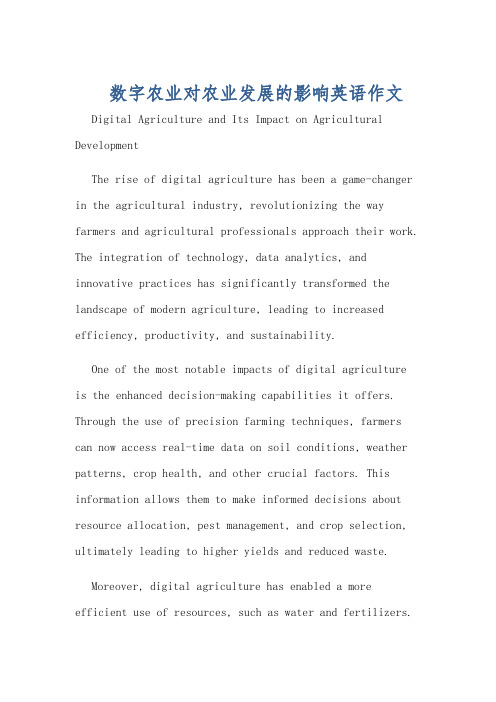
数字农业对农业发展的影响英语作文Digital Agriculture and Its Impact on Agricultural DevelopmentThe rise of digital agriculture has been a game-changer in the agricultural industry, revolutionizing the way farmers and agricultural professionals approach their work. The integration of technology, data analytics, and innovative practices has significantly transformed the landscape of modern agriculture, leading to increased efficiency, productivity, and sustainability.One of the most notable impacts of digital agricultureis the enhanced decision-making capabilities it offers. Through the use of precision farming techniques, farmers can now access real-time data on soil conditions, weather patterns, crop health, and other crucial factors. This information allows them to make informed decisions about resource allocation, pest management, and crop selection, ultimately leading to higher yields and reduced waste.Moreover, digital agriculture has enabled a moreefficient use of resources, such as water and fertilizers.Precision irrigation systems, for instance, can precisely monitor and regulate the amount of water needed for each crop, reducing water usage and minimizing the environmental impact of agricultural practices. Similarly, the use of drones and satellite imagery can help farmers identify areas in need of targeted fertilizer application, optimizing the use of these resources and minimizing over-application.Another significant impact of digital agriculture is the improved traceability and transparency of the food supply chain. Through the integration of blockchain technology and the Internet of Things (IoT), farmers and food producers can now track the journey of their products from farm to table. This enhanced traceability not only helps to ensure food safety and quality but also enables consumers to make more informed purchasing decisions, fostering a greater understanding and appreciation of the agricultural process.Furthermore, digital agriculture has opened up new opportunities for small-scale and marginalized farmers. By providing access to affordable technologies and digital platforms, these farmers can now participate in the globalmarket, connect with buyers, and access valuable information and resources. This has the potential to bridge the gap between large-scale commercial farming and small-holder agriculture, promoting more inclusive and sustainable agricultural development.In addition to these benefits, digital agriculture also plays a crucial role in addressing the challenges posed by climate change. Through the use of precision farming techniques and the integration of renewable energy sources, such as solar-powered irrigation systems, farmers can mitigate their carbon footprint and adapt to the changing environmental conditions. This not only contributes to the sustainability of the agricultural sector but also supports broader efforts to combat climate change.However, the adoption of digital agriculture is not without its challenges. Access to reliable internet connectivity, the cost of technology, and the need for digital literacy among farmers can be significant barriers, particularly in developing countries. Addressing these challenges requires a collaborative effort between governments, private sector organizations, and agriculturalcommunities to ensure that the benefits of digital agriculture are accessible to all.In conclusion, the impact of digital agriculture on agricultural development is profound and far-reaching. By enhancing decision-making, optimizing resource use, improving traceability, and promoting inclusivity, digital agriculture is poised to play a pivotal role in shaping the future of the agricultural industry. As the world continues to grapple with the challenges of food security, environmental sustainability, and climate change, the advancements in digital agriculture offer promising solutions that can help to secure a more resilient and prosperous agricultural future.数字农业对农业发展的影响数字农业的兴起已经成为农业行业的一个游戏规则改变者,彻底改变了农民和农业专业人士的工作方式。
数字农业对农业发展的影响英语作文
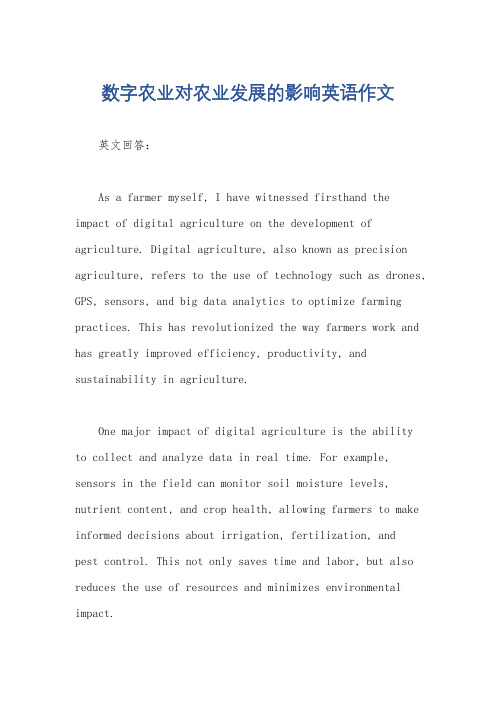
数字农业对农业发展的影响英语作文英文回答:As a farmer myself, I have witnessed firsthand the impact of digital agriculture on the development of agriculture. Digital agriculture, also known as precision agriculture, refers to the use of technology such as drones, GPS, sensors, and big data analytics to optimize farming practices. This has revolutionized the way farmers work and has greatly improved efficiency, productivity, and sustainability in agriculture.One major impact of digital agriculture is the abilityto collect and analyze data in real time. For example, sensors in the field can monitor soil moisture levels, nutrient content, and crop health, allowing farmers to make informed decisions about irrigation, fertilization, andpest control. This not only saves time and labor, but also reduces the use of resources and minimizes environmental impact.Furthermore, digital agriculture has enabled farmers to adopt precision farming techniques, such as variable rate application of inputs. By using GPS-guided tractors and drones to apply fertilizers and pesticides only where they are needed, farmers can reduce waste and optimize crop yields. This not only increases profitability, but also promotes sustainable agriculture practices.In addition, digital agriculture has improved communication and collaboration among farmers. Online platforms and mobile apps allow farmers to share information, market their products, and access resources and support. This has created a sense of community among farmers and has facilitated knowledge sharing and innovation in the agricultural industry.Overall, digital agriculture has had a transformative impact on agriculture, leading to increased efficiency, productivity, and sustainability. As a farmer, I have embraced these technologies and have seen the benefits firsthand. I believe that digital agriculture will continueto play a crucial role in the future of farming, helping to meet the challenges of feeding a growing global population while protecting the environment.中文回答:作为一名农民,我亲眼见证了数字农业对农业发展的影响。
数字农业对农业发展的影响英语作文

数字农业对农业发展的影响英语作文The Impact of Digital Agriculture on Agricultural DevelopmentIntroductionDigital agriculture, also known as precision agriculture, refers to the use of technologies such as data analytics, artificial intelligence, drones, and Internet of Things in agriculture to improve efficiency, productivity, and sustainability. This emerging field of agriculture has the potential to revolutionize the way farming is done and has already started making a significant impact on agricultural development worldwide. In this essay, we will explore the various ways in which digital agriculture is influencing agricultural development.1. Increased EfficiencyOne of the primary benefits of digital agriculture is the increased efficiency it brings to farming practices. With the use of data analytics and sensors, farmers can monitor their crops, soil, and livestock in real-time, enabling them to make informed decisions about irrigation, fertilization, and pest control. This precision farming approach allows farmers to use resources more efficiently, reducing waste and increasing yields.2. Improved ProductivityDigital agriculture also helps in improving productivity in agriculture. Through the use of drones and satellite imagery, farmers can quickly identify areas of their fields that need attention, such as nutrient deficiencies or pests infestations. This targeted approach to farming enables farmers to take corrective actions promptly, leading to healthier crops and higher yields.3. Sustainable AgricultureAnother significant impact of digital agriculture is its contribution to sustainable agriculture practices. By using precision farming techniques, farmers can reduce the use of chemical inputs, minimize water consumption, and lower greenhouse gas emissions. This environmentally friendly approach to farming not only benefits the planet but also helps farmers save money in the long run.4. Market AccessDigital agriculture also plays a crucial role in improving market access for farmers. By using online marketplaces ande-commerce platforms, farmers can connect directly with consumers, bypassing traditional middlemen and increasing their profit margins. This direct-to-consumer approach not onlybenefits farmers but also provides consumers with access to fresh, locally sourced produce.5. Skill DevelopmentDigital agriculture requires farmers to acquire new skills and knowledge to effectively use technology in their farming operations. This skill development aspect of digital agriculture is crucial for the future of agriculture, as it ensures that farmers stay competitive in a rapidly changing agricultural landscape. Training programs and workshops on digital agriculture can help farmers gain the necessary skills to maximize the benefits of technology on their farms.ConclusionIn conclusion, digital agriculture is transforming the way farming is done and is playing a significant role in agricultural development worldwide. Through increased efficiency, improved productivity, sustainable agriculture practices, enhanced market access, and skill development, digital agriculture is helping farmers increase their yields, reduce costs, and improve their livelihoods. As the world population continues to grow, digital agriculture will play a vital role in ensuring food security and sustainable agriculture for future generations.。
数字农业对农业发展的影响英语作文
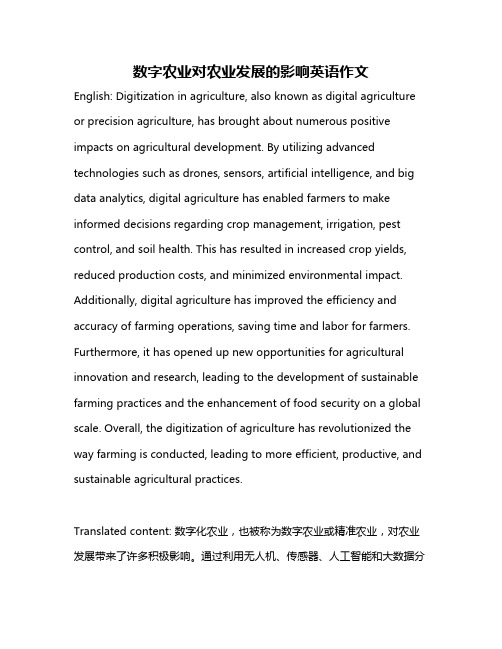
数字农业对农业发展的影响英语作文English: Digitization in agriculture, also known as digital agriculture or precision agriculture, has brought about numerous positive impacts on agricultural development. By utilizing advanced technologies such as drones, sensors, artificial intelligence, and big data analytics, digital agriculture has enabled farmers to make informed decisions regarding crop management, irrigation, pest control, and soil health. This has resulted in increased crop yields, reduced production costs, and minimized environmental impact. Additionally, digital agriculture has improved the efficiency and accuracy of farming operations, saving time and labor for farmers. Furthermore, it has opened up new opportunities for agricultural innovation and research, leading to the development of sustainable farming practices and the enhancement of food security on a global scale. Overall, the digitization of agriculture has revolutionized the way farming is conducted, leading to more efficient, productive, and sustainable agricultural practices.Translated content: 数字化农业,也被称为数字农业或精准农业,对农业发展带来了许多积极影响。
数字农业助推农业高质量发展中的问题及对策
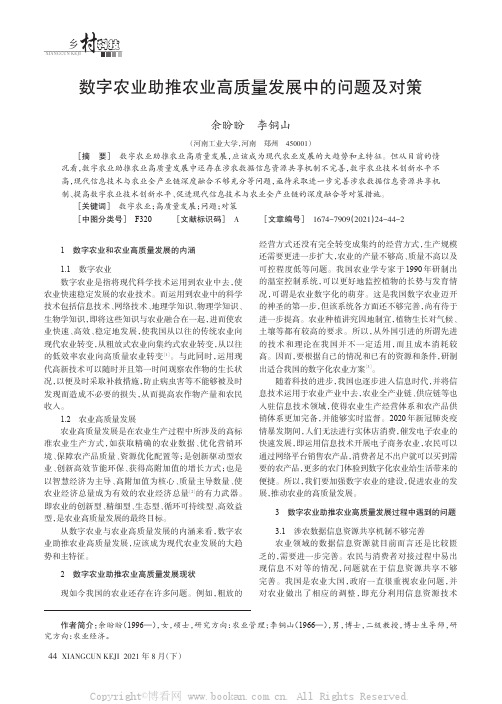
村乡科技XIANGCUN KEJI44XIANGCUN KEJI 2021年8月(下)数字农业助推农业高质量发展中的问题及对策余盼盼李铜山(河南工业大学,河南郑州450001)[摘要]数字农业助推农业高质量发展,应该成为现代农业发展的大趋势和主特征。
但从目前的情况看,数字农业助推农业高质量发展中还存在涉农数据信息资源共享机制不完善,数字农业技术创新水平不高,现代信息技术与农业全产业链深度融合不够充分等问题,亟待采取进一步完善涉农数据信息资源共享机制、提高数字农业技术创新水平、促进现代信息技术与农业全产业链的深度融合等对策措施。
[关键词]数字农业;高质量发展;问题;对策[中图分类号]F320[文献标识码]A[文章编号]1674-7909(2021)24-44-21数字农业和农业高质量发展的内涵1.1数字农业数字农业是指将现代科学技术运用到农业中去,使农业快速稳定发展的农业技术。
而运用到农业中的科学技术包括信息技术、网络技术、地理学知识、物理学知识、生物学知识,即将这些知识与农业融合在一起,进而使农业快速、高效、稳定地发展,使我国从以往的传统农业向现代农业转变,从粗放式农业向集约式农业转变,从以往的低效率农业向高质量农业转变[1]。
与此同时,运用现代高新技术可以随时并且第一时间观察农作物的生长状况,以便及时采取补救措施,防止病虫害等不能够被及时发现而造成不必要的损失,从而提高农作物产量和农民收入。
1.2农业高质量发展农业高质量发展是在农业生产过程中所涉及的高标准农业生产方式,如获取精确的农业数据、优化营销环境、保障农产品质量、资源优化配置等;是创新驱动型农业、创新高效节能环保、获得高附加值的增长方式;也是以智慧经济为主导、高附加值为核心、质量主导数量、使农业经济总量成为有效的农业经济总量[2]的有力武器。
即农业的创新型、精细型、生态型、循环可持续型、高效益型,是农业高质量发展的最终目标。
从数字农业与农业高质量发展的内涵来看,数字农业助推农业高质量发展,应该成为现代农业发展的大趋势和主特征。
数字农业与农业信息化发展的现状与趋势

数字农业与农业信息化发展的现状与趋势
石柳
【期刊名称】《农村科学实验》
【年(卷),期】2022()24
【摘要】农业生产的特点具有自然性和社会性的特征和规律,在其发展过程中受自然环境的影响非常大,因此在进行农业生产的时候必须要考虑到对环境的污染问题。
在我国的农村地区,由于经济落后,基础设施建设不完善,导致了很多的资源浪费,并且对生态环境造成了很大的破坏;同时,农民缺乏对新技术的了解以及信息的获取渠道,使得农业的发展受到限制。
目前,随着信息化的不断进步,数字化的时代已经到来,数字化的出现大大地提高了人们对于农产品质量安全、数量、产量等方面的要求;而且,数字化的应用也为农业提供了更多更好的服务。
通过利用计算机网络来实现数
字化管理,能够有效地解决传统模式下无法处理的一些复杂情况,从而促进现代农业
向着现代化方向发展。
当前,我国大部分地方都建立起比较完整的农业数据库,但是
却缺少专业人员去研究,没有形成统一规范的标准体系,这就不能保证各个环节之间
可以相互配合,也不利于数据的共享与交换。
【总页数】3页(P89-91)
【作者】石柳
【作者单位】河南省驻马店市农业市场信息工作站
【正文语种】中文
【中图分类】F32
【相关文献】
1.加强农业网建设推进信息化发展——南召农业信息网现状及农业信息化发展思路探讨
2.我国农业信息化发展的现状与趋势
3.全力发展农业信息化为智慧农业腾飞插上翅膀r——敦化市农业信息化发展现状
4.湖北省农业信息化发展现状及趋势分析
5.兵团数字农业及农业信息化发展前景
因版权原因,仅展示原文概要,查看原文内容请购买。
- 1、下载文档前请自行甄别文档内容的完整性,平台不提供额外的编辑、内容补充、找答案等附加服务。
- 2、"仅部分预览"的文档,不可在线预览部分如存在完整性等问题,可反馈申请退款(可完整预览的文档不适用该条件!)。
- 3、如文档侵犯您的权益,请联系客服反馈,我们会尽快为您处理(人工客服工作时间:9:00-18:30)。
论数字农业
论什么是数字农业
随着计算机技术的广泛应用,人类社会进入了信息化时代。
农业作为人类生活的基础在数字化的浪潮冲击下也受到了很大的影响。
在信息化的大环境下,“数字农业”也就应运而生并受到越来越多的重视。
所谓的数字工业(digital agriculture)是指用数字化技术,按人类需要的目标,对农业说涉及的对象和全过程进行数字化和可视化的表达、设计、控制、管理的农业。
数字农业建立在信息技术、生物工程技术、自动监控、农艺与农机技术等一系列高新技术上,力求最大限度上的节约资源,重视环境保护和生态均衡,追求以最少的资源消耗得最大的优质产出的高效益,以保持农业可持续发展。
数字农业是几千年来农业生产的巨大发展,必将对人类社会产生深远的影响。
还有一种有的学者认为数字农业有广义和狭义之分。
广义的数字农业,即信息化农业,包括农业要素(生物要素、环境要素、技术要素、社会经济要素等)、农业过程(生产、管理、储运、流通等)的数字化、网络化、自动化以及智能化,形成数字驱动的农业生产管理体系。
狭义的数字农业,是以农业空间信息机理为基础的、以“3S”技术为支撑的农业系统空间信息技术体系。
实际上数字农业是一个综合性很强的学科,很多与数字农业有关的理论和技术在不断的迅速发展。
数字农业是一项集农业科学、地球科学、信息科学、计算机科学、空间对地观测、数字通讯、环境科学等众多学科理论与技术于一体的现代科学体系,是由理论、技术和工程构成的三位一体的庞大系统工程。
数字农业是对有关农业资源(植物、动物、土地等)、技术(品种、栽培、病虫害防治,开发利用等)、环境、经济等各类数据的获取、存贮、处理、分析、查询、预测与决策支持系统的总称。
数字农业是信息技术在农业中应用的高级阶段,是农业信息化的必由之路;农业信息化、智能化、精确化与数字化将是信息技术在农业中应用的结果。
实现农业农村现代化、保障我国的食物安全、全面建设小康社会的关键在于推动农业科技的发展,创造条件进行一次新的技术革命,促使传统农业向现代农业转变,促使粗放生产向集约化经营转变。
可以预言,数字农业及其相关技术的快速发展和推广应用,必将成为新世纪农业科技革命不可缺少的重要内容,必将推动农业向高产、优质、高效及可持续方向发展,在带动广大农民致富和全面建设小康社会中发挥越来越重要的作用。
目前我国数字农业的不断发展,在其中也存在许多的不足。
1、农业信息化水平较低
收集信息,处理信息、传播信息的软硬件设备与网络体系不健全;已开发的大量农业经济信息系统、农作物病虫害数据库、作物品种资源管理数据库系统、农业突然系统分类数据库系统等大多不涉及空间维度,难以适应当前对空间数据信息的需求;对于来源多种多样、格式也不尽相同的各种数据的实时性、地域性、综合性处理还需做出很多努力。
2、农业信息化意识和利用信息的能力不强
一方面,许多基层农技人员和广大农业从业者,知识老化,整体素质有待进一步提高,对于利用现代技术,收集、处理、利用农业信息的意识和能力不强;另一方面,农业信息加工处理的技术人员缺乏,当前,就连最基本的能够及时、准确地提供农产品供需信息,对网络信息进行收集、整理,分析市场形势,回复网络用户的电子邮件,解答疑问等方面的人才也不多,更谈不上能够满足数字农业发展对于人才的要求。
3、农业信息化效益不明显
数字农业还刚刚起步,在国内总体上尚处于探索阶段,实用性、普遍性的技术应用还很少,直接带来的经济效益还没有很好地显现出来,
4、信息数据的管理和标准化工作有待进一步加强
地理信息系统(GIS)以及其他农业信息管理系统为了完成某种分析工作所要求的各种农业数据往往格式与结构不同,而且往往掌握在不同的管理部门或研究机构中。
因此,
未来建立在网络上的农业地理系统要具备获取和分析分布式存储数据的能力,也就是说我们要使所谓的WebGIS能够协同处理来自不同组织和机构的农业数据。
对于这些不足,我相信在不久的将来就会有很大的改善。
这个我们信心十足。
对于未来我国数字农业的发展的有很多的设想。
随着经济社会的快速发展和科技进步,在数字网络建设、原始数字化数据积累、数字化嘻嘻采集及其处理等方面的工作已有一定的基础,起动发展数字农业不仅是必要的,而且是可行的。
借鉴许多学者的研究结果,提出建设数字农业的基本设想,就是要在已有农业信息化建设成果基础上,建立可视化的农业地理信息系统,构建直观形象的农业管理模式,全面提升农业工作的信息化和现代化水平。
1、整合已有的农业信息
在国家、省级信息基础设施建设的基础上,以各级农业部门为依托,建设中央一省一市县信息骨干网络系统,形成一个功能完美、性能优良的农业综合信息网络系统,并与其他网络互联,成为一个全方位的农业资源和经济信息网络系统。
2、信息表达要直观、形象,并要实现信息系统的联网
把市内的地形、地貌、交通、村镇、行政区划等基础地理信息以及耕地分布、土壤类型、种植结构、水肥状况、农作物生长发育、气象、病虫害、农民知识、乡镇企业、农业法律法规等各种农业信息以图形图像等直观形象的可视化电子地图与相关信息的形式在投影视频系统上进行显示和表达,随着数字农业的发展,逐步做到与省级、国家级类似的信息系统进行交互式查询等。
3、强化对科研、管理等的服务工作
通过对基础地理信息和农业专题信息的空间分析、网络分析和追踪分析等,实现农业科研、管理和决策人员在全市三位农业电子模型上,对农业生产中的现象、过程进行模拟,高效、直观、形象地为农业工作的规划、设计、建设、经营、管理、服务、决策等提供科学依据。
综上来看,我国数字农业的发展前景广阔。
这一切都将会给我国的经济带来巨大的发展,给我国的农业发展带来的收益也会是不可估量的。
